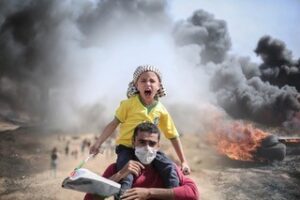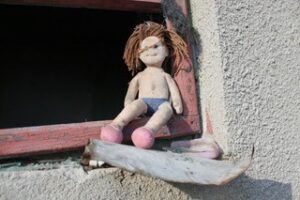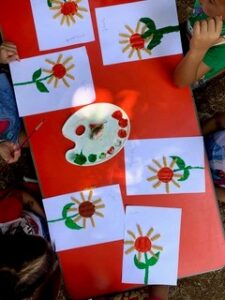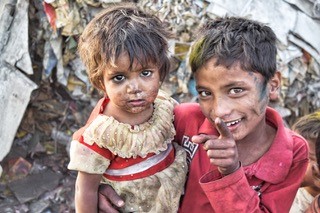CHILDREN IN ARMED CONFLICTS: A DECLINING SITUATION
Nelson Mandela said that “there can be no keener revelation of a society’s soul than the way in which it treats its children”. The children have always been one of the most vulnerable groups in society, with particular attention to those living in contexts of armed conflicts. From physical to psychological violence, from migration to abduction, these children are victims of inhumane behaviour perpetrated by state and non-state actors who, directly or indirectly, carry out actions that seriously affect their safety.
According to UNHRC Article 38, “States should do all they can to protect children under 15 from taking part in the conflict of joining armed forces. Children in conflict zones should be given special protection. “
The commitment of the global community was marked by the UN Security Council Resolution 1612, which established the Children and Armed Conflict (CAAC) agenda and the Monitoring and Reporting Mechanisms (MRM).
In 2017, the UN also identified and condemned 6 violations against children in armed conflict:1) Killing and maiming; 2) Recruitment and use of children by armed forces or armed groups; 3) Attacks on schools or hospitals; 4) Rape or other sexual violence; 5) Abduction; 6) Denial of humanitarian access.
“However,”- said the Vice-Minister of Italy for Foreign Affairs and International Cooperation Mrs. Sereni, during the MED Dialogues – “signing and ratifying international instruments is not enough. Tangible actions must follow.”
Numbers
 The latest report of the Special Representative of the Secretary-General for Children and Armed Conflict covers the period from July 2019 to August 2020. It shows 25,000 serious violations against children – including 4,400 incidents of denial of humanitarian access, 927 attacks on schools and hospitals, 735 cases of sexual violence. During the last decade, more than 90,000 children were killed in conflict zones, with an average of 25 children per day. Even those children who have the grace to survive are condemned to a long-term psychological and therefore social impact. We are losing an entire generation.
The latest report of the Special Representative of the Secretary-General for Children and Armed Conflict covers the period from July 2019 to August 2020. It shows 25,000 serious violations against children – including 4,400 incidents of denial of humanitarian access, 927 attacks on schools and hospitals, 735 cases of sexual violence. During the last decade, more than 90,000 children were killed in conflict zones, with an average of 25 children per day. Even those children who have the grace to survive are condemned to a long-term psychological and therefore social impact. We are losing an entire generation.
Covid-19 effect
 The pandemic pushed the most vulnerable even further behind. Covid-19 is exposing children in armed conflicts to an added form of violence, exploitation, and abuse, further exaggerating their vulnerability and existing patterns of grave violations. “The socio-economic impact of lockdowns has generated poverty, which creates a push factor for early marriages of girls and the recruitment of minors by armed forces and groups” stated Mrs. Virginia Gamba, Special Representative of the UN Secretary-General for Children and Armed Conflicts. Furthermore, lockdowns have an impact on access to services, such as those of reintegration, education, and healthcare. Armed groups are using the school’s empty buildings as military training grounds and, they are bombing hospitals. This will increase as the Covid-19 vaccines become available for those zones.
The pandemic pushed the most vulnerable even further behind. Covid-19 is exposing children in armed conflicts to an added form of violence, exploitation, and abuse, further exaggerating their vulnerability and existing patterns of grave violations. “The socio-economic impact of lockdowns has generated poverty, which creates a push factor for early marriages of girls and the recruitment of minors by armed forces and groups” stated Mrs. Virginia Gamba, Special Representative of the UN Secretary-General for Children and Armed Conflicts. Furthermore, lockdowns have an impact on access to services, such as those of reintegration, education, and healthcare. Armed groups are using the school’s empty buildings as military training grounds and, they are bombing hospitals. This will increase as the Covid-19 vaccines become available for those zones.
Sexual violence
 The above-mentioned report also underlines the drastic situation of sexual violence. Unable to go to school because of the pandemic, girls are forced to be “child brides”, with their families not in the position to provide for them. Marriages represent an escape from poverty, but most of all they are a trap that takes away from them what a little bit of childhood innocence remains.
The above-mentioned report also underlines the drastic situation of sexual violence. Unable to go to school because of the pandemic, girls are forced to be “child brides”, with their families not in the position to provide for them. Marriages represent an escape from poverty, but most of all they are a trap that takes away from them what a little bit of childhood innocence remains.
Special attention is given to Yemen and Afghanistan, where “bacha bazi” episodes have been reported. It is a phenomenon of sexual slavery and child prostitution, whereby men abuse male children: they are obliged to dance and entertain older males, dressed as women, and then exposed to sexual violations.
To be monitored
Again, during the MED dialogues, Mrs. Virginia Gamba expressed particular apprehension about two particular issues. Her first concern is limited access to conflict zones, which doesn’t allow UN presence and humanitarian aid. Thus, the reports can show only the tip of the iceberg of what is happening.
Secondly, she worries about displaced children. Migrant minors travelling unaccompanied are extremely vulnerable and at risk of being victims of grave violations. They may suffer from abduction recruitment, sexual exploitation, trafficking, and deprivation of liberty. This happens in places such as Lybia, Lebanon, Syria, and Palestine.
The picture is not grim
 To make the difference, it is urgent to prioritize and pursue regional solutions for better protecting children from the devastating impact of conflicts. These solutions must involve education, which is a target for armed groups. 106 countries have already joined The Safe School Declaration to protect education from attacks. By joining the declaration, countries commit to endorsing the guidelines for protecting schools and universities from military use during armed conflicts. Furthermore, 38 universities from all over the world joined together to work in line with the UN 2030 Agenda, creating the first International Universities Network for Children in Armed Conflicts (UNETCHAC).
To make the difference, it is urgent to prioritize and pursue regional solutions for better protecting children from the devastating impact of conflicts. These solutions must involve education, which is a target for armed groups. 106 countries have already joined The Safe School Declaration to protect education from attacks. By joining the declaration, countries commit to endorsing the guidelines for protecting schools and universities from military use during armed conflicts. Furthermore, 38 universities from all over the world joined together to work in line with the UN 2030 Agenda, creating the first International Universities Network for Children in Armed Conflicts (UNETCHAC).
The pandemic has highlighted how the well-being of one depends on that of the other; we are all part of the same destiny. That is why it is a duty and moral imperative to provide all the world with vaccines. Once the pandemic will be over, it will not be possible to return to the so hoped-for “normality”. On the contrary, it is essential to start by challenging the old normality in order to build a new one in which schools all over the world can be safe places; in which every child can truly be free to live their innocence without fear. The world cannot progress as long as this violence and inequalities exist.

